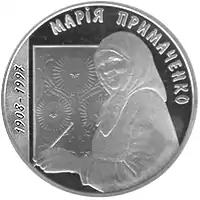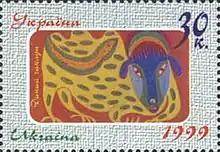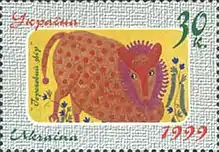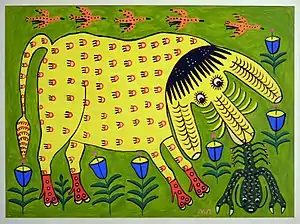Maria Prymachenko
Maria Pryimachenko (Ukrainian: Марія Оксентіївна Примаченко) (1908–1997) was a Ukrainian village folk art painter, representative of naïve art. The artist was involved with drawing, embroidery and painting on ceramics. Laureate of the National Prize of Ukraine named after T.G. Shevchenko. Honored Artist of the USSR since 1970, People's Artist of Ukraine. 2009 — according to UNESCO - was recognized as the year of Maria Primachenko.[1]
Maria Prymachenko | |
|---|---|
 Coin of the Bank of Ukraine | |
| Born | Mariya Oksentiyivna Prymachenko Марі́я Оксе́нтіївна Примаче́нко January 12, 1909 [O.S. December 30] 1908 |
| Died | August 18, 1997 (88) |
| Resting place | Bolotnia, Ivankiv Raion, Ukraine) |
| Nationality | Ukrainian |
| Education | Self-taught |
| Known for | Painting, drawing, embroidery |
| Movement | Naïve art |
| Awards | Shevchenko National Prize, 1966 |
Biography
Maria was a peasant woman.[2] She was born and spent all her life in the village of Bolotnya in the Ivankiv Raion, Kiev Oblast, situated only 30 km (19 mi) from Chernobyl.
In her childhood Maria was taken ill with polio, and this painful disease influenced the girl's life. By reports of her relatives, Maria grew а thoughtful and considerate person, having compassion for nature and every living thing.
Her way in art began, by her own words, like this: "Once, as a young girl, I was tending a gaggle of geese. When I got with them to a sandy beach, on the bank of the river, after crossing a field dotted with wild flowers, I began to draw real and imaginary flowers with a stick on the sand… Later, I decided to paint the walls of my house using natural pigments. After that I’ve never stopped drawing and painting."
In Kyiv, Pryimachenko met Vasyl Marynchuk. In March 1941, their son Fedor was born. They did not have time to get married - Vasily went to war and did not return.
Fedor Primachenko's son was a close friend and a talented follower, he became a folk artist, a master of naivete. He and his wife raised two sons, the artist's grandchildren.[3]
Creative works


In 1936 Maria Ovksentiyivna was invited to experimental workshops. Folk talents were gathered here, Pryimachenko was among them.
In 1936, at the First Republican Exhibition of Folk Art, Pryimachenko's paintings were given a whole hall. This exhibition was seen by Moscow, Leningrad, and Warsaw. Maria Prymachenko was awarded a first-degree diploma for participating in an exhibition of folk art in 1936. Since then, her works have been exhibited with constant success at exhibitions in Paris, Warsaw, Sofia, Montreal, and Prague. In 1937 the artist's works were exhibited in Paris. She became famous.
Mysterious and emotionally charged, the works of Maria Pryimachenko, a folk master of Ukrainian decorative painting, seem to absorb the age-old traditions of many generations of Ukrainian master-craftsmen who, from the depths of the centuries, have brought forth their understanding of good and evil, of ugliness and beauty.
Images often had арреаred to the artist in dreams and later materialized in her compositions. Maria Pryimachenko's art works depict fabulous mythological beasts and take their roots in folk legends and fairy-tales, nourished by real life and culture of the Ukrainian реорlе.
The works of Pryimachenko can be subdivided into thematic, symbolic and ornamental pieces. All compositions are characterized by a subtle and fluent rhythmical arrangement. There is a maxim: "Style makes man." As for Pryimachenko, one can state this in reverse: man makes style, for Maria Pryimachenko has developed a style of her own. In this evolution one can discern traces of constructivism (1930s); the victory of harmony (1960s- 1970s); and the decorative approach (1980s). Her latest works impress one by their daring decorativeness of form. Pryimachenko gravitates to the world of fairy-tale and mystery: her birds, beasts and plants interact on her pictures just as harmoniously and easily as they do in natural surroundings. Philosophy of the good animates the content of her works. The good embodied in the images of 'kind' beasts and birds (lions, bears, hares, storks, swallows) is juxtaposed against the evil, this mighty force which is sometimes difficult to identify with certain living things. The artist often resorts to her favoured device of personification: she depicts fabulous animals with large eyes surrounded with a trim of eyelashes.
Thematic compositions occupy a special place in Pryimachenko's creative legacy as far as the complexity of compositional arrangement and harmonious balance are concerned. Raw actuality and fairy-tale become blended in her compositions into one single whole, triumphantly demonstrating the unity of Nature. People depicted in these compositions are composed and full of dignity and self-respect. Her early compositions were executed against a white background, associated with the whitewashed walls of peasant cottages. But in the 1970s-1980s the artist turned to coloured backgrounds. It seems that colour itself creates the effect of colour-bearing space. There are no professional secrets in her arsenal: she paints on Whatman paper with factory-manufactured brushes and uses gouache and water colours. She prefers gouache which gives a bright and thick decorative base with graphic contours. Apart from searches in colour scheme, the artist strives to achieve expressive outlines and an effective rhythmical arrangement. Another salient feature of Prymachenko's art is a keen sense of composition, which is especially evident in her choice of format. Horizontal formats are most suitable for topical and multifigured compositions depicting subsequent scenes of the narration, while the vertical format is used for representative decorative compositions.
The originality of the artist's imagery is revealed in her unique formal and stylistic discoveries (the depiction of trees, simultaneous representation of a cottage's interior and exterior, etc.).
The struggle between good and evil permeates all of Pryimachenko's works. Good always triumphs in her compositions. But the motif of exuberant joy often gives way to sorrow and grief (a grave adorned with flowers and rushnyks is frequently depicted on her pictures).
The compositions of Maria Pryimachenko were exhibited all over the former Soviet Union, Ukraine and other countries (Poland, Bulgaria, France and Canada).[4] Her albums were published widely all over the world.
Prymachenko's painting Rat on a Journey was copied by the famous Finnish designer Kristina Isola to a fabric design Folks in the Woods which was also used by Finnair on their plane decoration.[5]
 Sunflowers and peas
Sunflowers and peas Flowers for Peace. 1965
Flowers for Peace. 1965 Ukrainian bull. 1977
Ukrainian bull. 1977 Eared beast grasped a Crustacean. 1983
Eared beast grasped a Crustacean. 1983
See also
- Yuriy Khimich (1928–2003)
References
- "Примаченко Марія Оксентіївна", Вікіпедія (in Ukrainian), 2021-01-12, retrieved 2021-01-15
- Pryimachenko Maria, Sixteen Paintings in the National Museum of Ukrainian Folk Art, Shown On A Set of Sixteen Color Postcards Published By Aurora Art Publishers, Leningrad, 1979, "Art Ukraine" site
- "75 років від дня народження Федора Васильовича Примаченка (Приймаченко) (1941–2008), майстра народного декоративного розпису. Народився на Київщині — Славутицька бібліотека". slavutichlib.com.ua. Retrieved 2021-01-15.
- 100th anniversary of the birth of Maria Primachenko, painter (1908-1997), Unesco Portal, year 2008
- Daily Marimekko print copied from Ukrainian folk artist, News by Yle.fi, date 29 May 2013, (in English)
External links
- Works of Maria Primachenko on "Art Ukraine" site at the Wayback Machine (archived July 11, 2012) (in English)
- A set of postcards by Maria Primachenko. Leningrad, Aurora Art Publishers, 1979.
- "Meine Welt". Maria Prymatschenko — Malerei. Wiktor Maruschtschenko — Fotografie. Katalog Berlin, Kommunale Galerie, 2000.